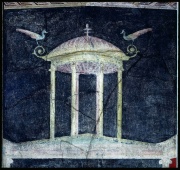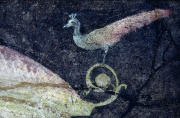Difference between revisions of "Fresco pigments"
(username removed) |
(username removed) |
||
| Line 2: | Line 2: | ||
== Description == | == Description == | ||
| − | A group of pigments that remain stable and chemically resistant to the lime plaster used as a base in fresco paintings. The highly alkaline, lime base in fresco paintings may react with and alter the color of some pigments. For example, [http://cameo.mfa.org/materials/fullrecord.asp?name=Prussian | + | A group of pigments that remain stable and chemically resistant to the lime plaster used as a base in fresco paintings. The highly alkaline, lime base in fresco paintings may react with and alter the color of some pigments. For example, [http://cameo.mfa.org/materials/fullrecord.asp?name=Prussian%20blue Prussian blue] and [http://cameo.mfa.org/materials/fullrecord.asp?name=chrome%20yellow chrome yellow] both discolor within a few hours. [http://cameo.mfa.org/materials/fullrecord.asp?name=Lead%20white Lead white] may turn black slowly. Other pigments, such as some [http://cameo.mfa.org/materials/fullrecord.asp?name=ultramarine%20blue%2C%20natural ultramarines] and [http://cameo.mfa.org/materials/fullrecord.asp?name=ivory%20black ivory black], may contain dissolved salts that will slowly leach to the surface and leave a white efflorescence. Examples of fresco pigments are: [http://cameo.mfa.org/materials/fullrecord.asp?name=carbon%20black carbon black], [http://cameo.mfa.org/materials/fullrecord.asp?name=iron%20oxide iron oxide], [http://cameo.mfa.org/materials/fullrecord.asp?name=chromium%20oxide chromium oxide], and [http://cameo.mfa.org/materials/fullrecord.asp?name=cobalt%20blue cobalt blue]. |
[[File:25.44-P-48-3.jpg|thumb|Detail of fresco | [[File:25.44-P-48-3.jpg|thumb|Detail of fresco | ||
| Line 24: | Line 24: | ||
== Authority == | == Authority == | ||
| − | * | + | * Ralph Mayer, ''A Dictionary of Art Terms and Techniques'', Harper and Row Publishers, New York, 1969 (also 1945 printing) |
| − | * | + | * Kurt Wehlte, ''The Materials and Techniques of Painting'', Van Nostrand Reinhold Co., New York, 1975 Comment: p. 254 |
[[Category:Materials database]] | [[Category:Materials database]] | ||
Revision as of 07:49, 24 July 2013
Description
A group of pigments that remain stable and chemically resistant to the lime plaster used as a base in fresco paintings. The highly alkaline, lime base in fresco paintings may react with and alter the color of some pigments. For example, Prussian blue and chrome yellow both discolor within a few hours. Lead white may turn black slowly. Other pigments, such as some ultramarines and ivory black, may contain dissolved salts that will slowly leach to the surface and leave a white efflorescence. Examples of fresco pigments are: carbon black, iron oxide, chromium oxide, and cobalt blue.
Synonyms and Related Terms
limeproof pigments; pigmentos para el fresco (Esp.); pigmentos resistentes a la cal (Esp.); pigments pour fresque (Fr.); pigmentos para pintura a fresco (Port.)
Additional Information
K.Wehlte, The Materials and Techniques of Painting, Van Nostrand Reinhold Co., New York, 1975.
Additional Images
Authority
- Ralph Mayer, A Dictionary of Art Terms and Techniques, Harper and Row Publishers, New York, 1969 (also 1945 printing)
- Kurt Wehlte, The Materials and Techniques of Painting, Van Nostrand Reinhold Co., New York, 1975 Comment: p. 254


